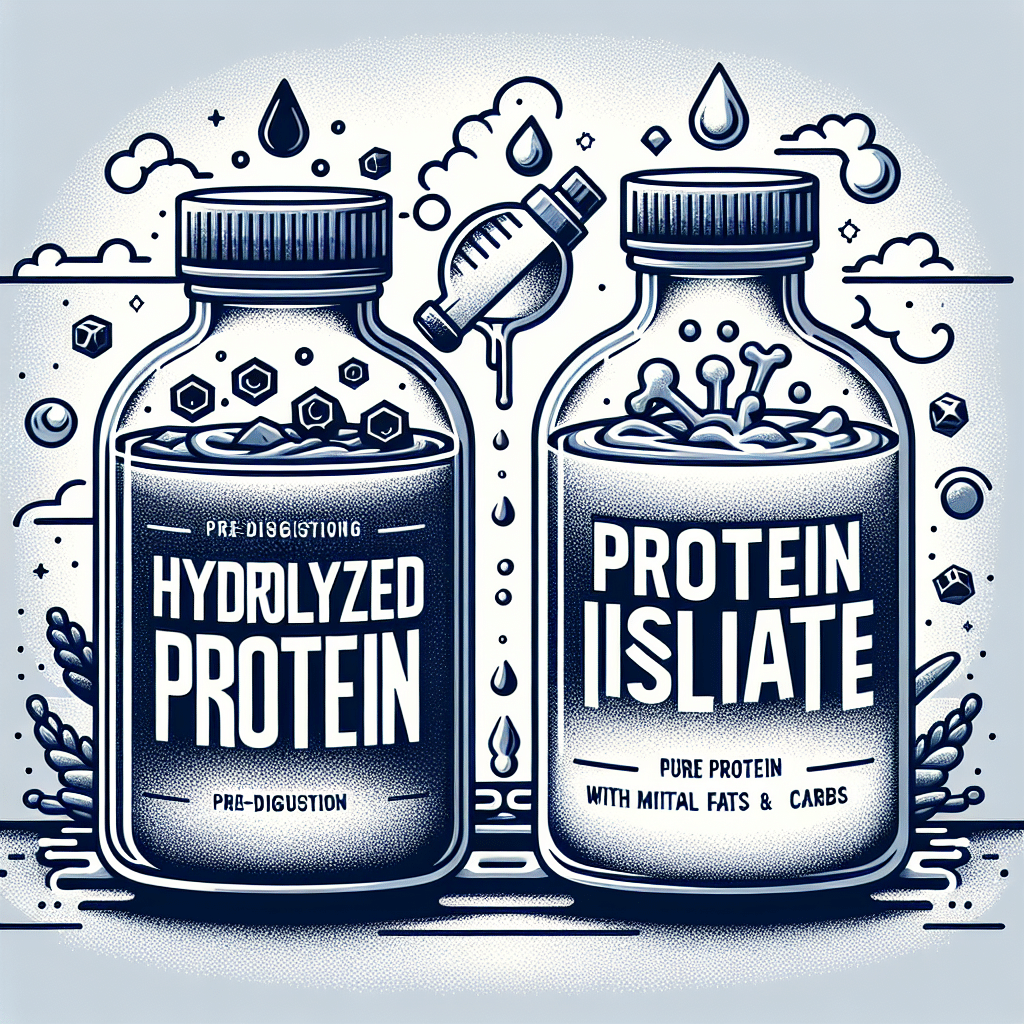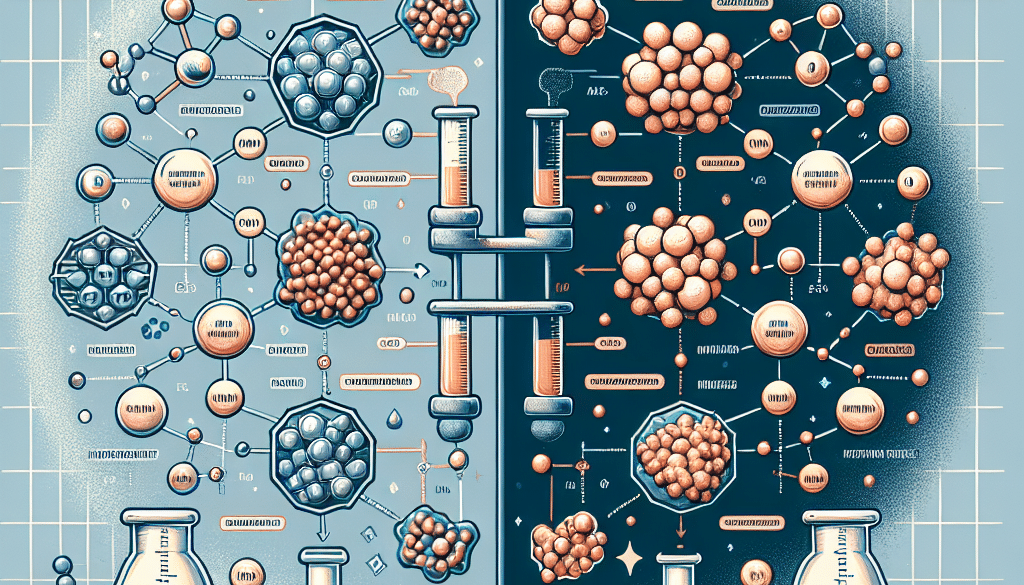Is Hydrolyzed Protein The Same As Isolate?
-
Table of Contents
- Hydrolyzed Protein vs. Isolate: Understanding the Differences
- What is Hydrolyzed Protein?
- What is Protein Isolate?
- Comparing Hydrolyzed Protein and Protein Isolate
- Processing Techniques
- Digestion and Absorption
- Nutritional Profile
- Taste and Texture
- Use Cases and Preferences
- Choosing the Right Protein for Your Needs
- Conclusion: Key Takeaways on Hydrolyzed Protein and Isolate
- Discover ETprotein’s Premium Protein Products
Hydrolyzed Protein vs. Isolate: Understanding the Differences

When it comes to protein supplements, the market is flooded with various types that cater to different dietary needs and health goals. Among the plethora of options, hydrolyzed protein and protein isolate are two terms that often cause confusion. Are they the same, or do they differ in composition, digestion, and nutritional benefits? This article delves into the specifics of hydrolyzed protein and protein isolate, comparing their characteristics and uses to help you make an informed decision about your protein intake.
What is Hydrolyzed Protein?
Hydrolyzed protein, also known as hydrolysate, is a form of protein that has undergone the process of hydrolysis. This involves breaking down the protein’s long chains of amino acids into shorter chains or individual amino acids. The hydrolysis process can be achieved through various methods, including enzymatic hydrolysis, where specific enzymes are used to cleave the peptide bonds.
- Hydrolyzed protein is easier to digest and is absorbed more quickly by the body.
- It is often recommended for individuals with digestive issues or those who require rapid absorption of nutrients, such as athletes post-workout.
- Hydrolyzed protein can be derived from various sources, including whey, casein, soy, and plant-based proteins.
What is Protein Isolate?
Protein isolate refers to a highly purified form of protein that has been isolated from its original source through various filtration processes. The goal is to remove a significant amount of fat, carbohydrates, lactose, and other non-protein components, resulting in a product that is typically 90-95% protein by weight.
- Protein isolates provide a high concentration of protein with minimal additional macronutrients.
- They are suitable for individuals looking to increase their protein intake without consuming excess calories from fats or carbs.
- Common sources of protein isolate include whey isolate, soy isolate, and pea isolate.
Comparing Hydrolyzed Protein and Protein Isolate
While both hydrolyzed protein and protein isolate offer high-quality protein, they differ in their processing, digestion rate, and potential benefits. Here’s a closer look at how they compare:
Processing Techniques
Hydrolyzed protein undergoes hydrolysis to break down protein structures, while protein isolate is filtered to remove non-protein components. The processing techniques used for each type of protein are distinct and serve different purposes.
Digestion and Absorption
Hydrolyzed proteins are known for their rapid digestion and absorption due to the pre-digested state of the amino acids. Protein isolates also digest relatively quickly but may not be as fast as hydrolyzed proteins.
Nutritional Profile
Protein isolates are typically lower in fats and carbohydrates compared to hydrolyzed proteins, which may still contain varying levels of these macronutrients depending on the degree of hydrolysis.
Taste and Texture
The hydrolysis process can sometimes result in a bitter taste, which may be off-putting to some consumers. Protein isolates generally have a neutral taste and smoother texture, making them more versatile for use in recipes and shakes.
Use Cases and Preferences
Hydrolyzed proteins are often preferred by athletes and individuals with digestive sensitivities, while protein isolates are popular among those on calorie-restricted diets or with lactose intolerance.
Choosing the Right Protein for Your Needs
When selecting a protein supplement, consider your dietary restrictions, health goals, and personal preferences. For example, if you have a lactose intolerance, a whey protein isolate might be more suitable than a whey hydrolysate. Conversely, if you’re looking for rapid recovery post-exercise, a hydrolyzed protein could be more beneficial.
Conclusion: Key Takeaways on Hydrolyzed Protein and Isolate
In summary, hydrolyzed protein and protein isolate are not the same. Hydrolyzed protein offers quick digestion due to its pre-digested form, while protein isolate provides a high concentration of protein with minimal other macronutrients. Your choice between the two should be guided by your specific health needs, dietary restrictions, and taste preferences.
Discover ETprotein’s Premium Protein Products
If you’re in the market for high-quality protein supplements, consider ETprotein’s range of products. They offer a variety of organic and non-GMO protein options, including rice protein, pea protein, and specialty proteins like watermelon seed and pumpkin seed proteins. With a focus on purity and a neutral taste profile, ETprotein caters to various industries and individual needs.
Whether you’re looking for a protein supplement for sports nutrition, weight management, or general health and wellness, ETprotein has a product to suit your requirements. Their commitment to quality and customer satisfaction makes them a top choice for consumers and businesses alike.
About ETprotein:
ETprotein, a reputable protein and L-(+)-Ergothioneine (EGT) Chinese factory manufacturer and supplier, is renowned for producing, stocking, exporting, and delivering the highest quality organic bulk vegan proteins and L-(+)-Ergothioneine. They include Organic rice protein, clear rice protein, pea protein, clear pea protein, watermelon seed protein, pumpkin seed protein, sunflower seed protein, mung bean protein, peanut protein, and L-(+)-Ergothioneine EGT Pharmaceutical grade, L-(+)-Ergothioneine EGT food grade, L-(+)-Ergothioneine EGT cosmetic grade, L-(+)-Ergothioneine EGT reference grade and L-(+)-Ergothioneine EGT standard. Their offerings, characterized by a neutral taste, non-GMO, allergen-free attributes, with L-(+)-Ergothioneine purity over 98%, 99%, cater to a diverse range of industries. They serve nutraceutical, pharmaceutical, cosmeceutical, veterinary, as well as food and beverage finished product distributors, traders, and manufacturers across Europe, USA, Canada, Australia, Thailand, Japan, Korea, Brazil, and Chile, among others.
ETprotein specialization includes exporting and delivering tailor-made protein powder and finished nutritional supplements. Their extensive product range covers sectors like Food and Beverage, Sports Nutrition, Weight Management, Dietary Supplements, Health and Wellness Products, and Infant Formula, ensuring comprehensive solutions to meet all your protein needs.
As a trusted company by leading global food and beverage brands and Fortune 500 companies, ETprotein reinforces China’s reputation in the global arena. For more information or to sample their products, please contact them and email sales(at)ETprotein.com today.












